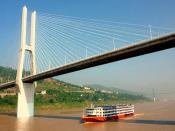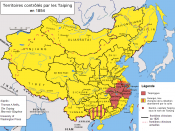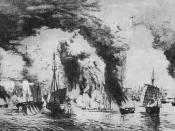The Taiping Rebellion was a forerunner in the events that would move modern China from its traditional imperialistic and feudalistic society to a dynasty of the people. Although for years prior to the Taiping uprising there were many underground societies that hoped to achieve the same goals as the Taipings of overthrowing the imperialist government, the Taiping rebellion was the largest, most successful standoff in the history of China to its date. The scale of the Taiping rebellion was such that it required complete imperial attention at times. The rebellion was the awakening of China. The Taipings created a rift between modern china and its traditional society that would be cause for drastic change in the following years. Not only did the Taiping rebellion merit imperial attention, but also attracted the attention of foreigners who watched on as the war between the new age Taipings and old world imperialists raged for fourteen years.
What was known as the T'aip'ing T'ien-Kuo""the Heavenly Kingdom of Great Peace""was about to change China forever (Michael 3).
Although the Taiping rebellion began in 1850, there were many events that led up to the actual uprising. In the seventeenth and eighteenth centuries Chinese culture had begun to move from traditional beliefs. Western culture had moved into Chinese culture, eventually moving into the foreground of it. Western religion especially played a huge role in the rebellion, as Christianity was fused into the ideology of the Taipings. In the mid-nineteenth century several natural disasters, including floods, droughts, and famines swept through the entire country. The ruling government at the time""the Manchus""or the Ch'ing Dynasty""neglected the problems and offered no aid or relief to the people of China. This, along with the defeat of the Manchus in the Opium War by the English, caused the people of China...


